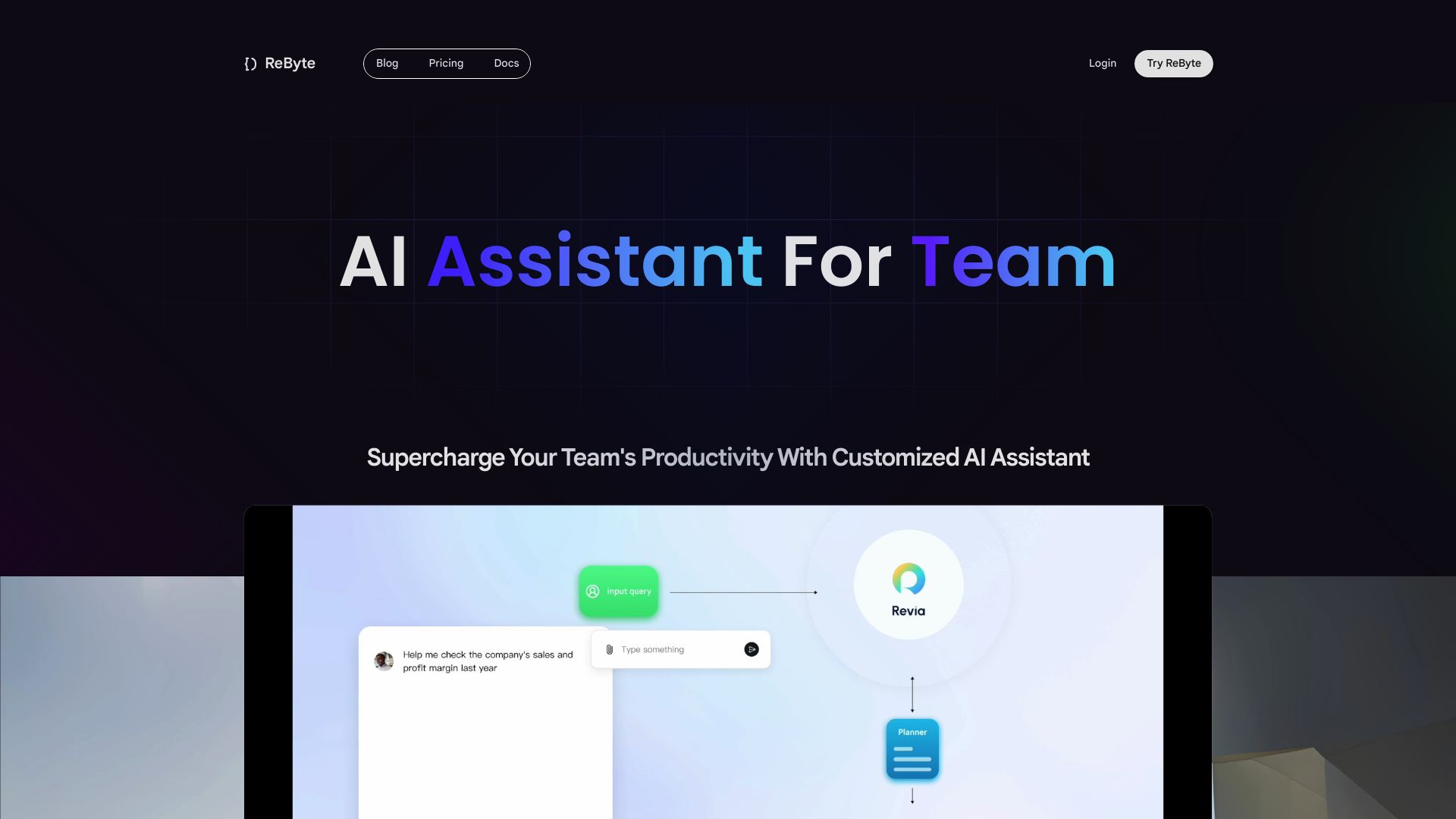AutoGPT vs. Rebyte: Comparing AI Agent Development Platforms
AI agent development platforms push the boundaries of what’s possible in software automation and intelligent task execution. AutoGPT vs. Rebyte stand out as powerful contenders in this space, each offering unique approaches to AI creation and deployment. This comparison delves into the strengths and limitations of both platforms, examining their features, use cases, and overall utility.
We’ll explore how AutoGPT’s autonomous problem-solving capabilities stack up against Rebyte’s visual, no-code approach to AI application development. By the end, you’ll have a clear understanding of which platform might best suit your AI development needs, whether you’re a seasoned developer, a business leader, or an AI enthusiast looking to harness the power of intelligent agents.
AutoGPT Overview
AutoGPT revolutionizes AI development with its open-source platform for creating autonomous agents. Developers leverage GPT-4 or GPT-3.5 to build AI assistants capable of completing complex tasks without constant human input.


AutoGPT’s visual builder empowers users to construct AI agents through drag-and-drop functionality. This no-code approach democratizes AI creation, allowing even those without extensive programming knowledge to develop sophisticated agents. The platform excels at breaking down large tasks into manageable sub-tasks, maintaining short-term memory for context, and autonomously executing user-defined goals.
AutoGPT’s visual builder empowers users to construct AI agents through drag-and-drop functionality. This no-code approach democratizes AI creation…
Key features include multimodal input processing, supporting both text and images, and a robust debugging mode for troubleshooting. AutoGPT integrates with REST APIs and custom plugins, expanding its functionality. The platform deploys via Docker, ensuring scalability and ease of implementation across various environments.
While AutoGPT offers powerful capabilities, it faces challenges. The system lacks long-term memory, potentially affecting performance in extended operations. Additionally, the recursive nature of its processes can lead to high operational costs. Users should also be aware of potential errors stemming from self-feedback loops and occasional AI hallucinations.
AutoGPT positions itself as a stepping stone towards artificial general intelligence (AGI). Its ability to self-prompt and make decisions autonomously sets it apart from traditional AI models. For developers and businesses seeking to harness cutting-edge AI technology, AutoGPT provides a flexible, powerful toolset for creating adaptive, goal-oriented AI agents.
Rebyte Overview
Rebyte empowers users to rapidly develop AI-powered applications without extensive coding skills. The platform’s visual agent builder lets anyone create customized AI agents by combining modular blocks, enabling complex backend logic construction through an intuitive drag-and-drop interface.


Rebyte’s no-code approach extends beyond agent creation to UI design, allowing users to craft fully customized interfaces for their AI applications. The platform also facilitates integrations with private data sources, providing flexibility in leveraging existing information assets. Detailed observability into each step of an agent’s processes offers transparency and aids in debugging and optimization.
Rebyte empowers users to rapidly develop AI-powered applications without extensive coding skills. The platform’s visual agent builder lets anyone create customized AI agents by combining modular blocks…
A key strength of Rebyte lies in its serverless runtime, engineered for production deployment and seamless scaling of AI agents. This feature addresses the critical need for robust, scalable AI solutions in enterprise environments. The platform manages the entire lifecycle of AI applications, from development to deployment, with minimal manual coding required.
While Rebyte excels in visual building and deployment ease, it lacks some advanced features. The platform does not offer multi-agent collaboration or scheduled agent functionality, which may limit its utility for complex, coordinated AI tasks. Additionally, Rebyte’s focus on no-code development may not fully satisfy the needs of users seeking deep customization through traditional coding.
Feature Comparison
AutoGPT and Rebyte offer contrasting approaches to AI agent development. AutoGPT focuses on autonomous, self-prompting agents capable of breaking down complex tasks, while Rebyte emphasizes visual building and no-code development for rapid AI application creation.
AutoGPT excels in autonomous problem-solving, leveraging GPT-4 or GPT-3.5 to generate and execute subtasks without constant human input. Its debug mode and multimodal capabilities allow for sophisticated agent behavior. However, AutoGPT lacks long-term memory and faces challenges with self-feedback loops, potentially affecting performance in extended operations.
Rebyte, on the other hand, prioritizes accessibility and rapid development. Its visual builder and no-code approach enable users to create AI applications quickly, with a focus on UI customization and integration with private data sources. Rebyte’s serverless runtime facilitates seamless production deployment and scaling. Yet, Rebyte doesn’t offer multi-agent collaboration or scheduled agent functionality, limiting its utility for complex, coordinated AI tasks.
In terms of security, neither platform explicitly mentions robust data encryption or IP control features. AutoGPT supports OAuth authentication, while Rebyte’s security measures remain unclear from the available information. This gap in security features may be a concern for enterprise users handling sensitive data.
Feature Comparison Table
| AutoGPT | Rebyte | SmythOS | |
|---|---|---|---|
| CORE FEATURES | |||
| Hosted Agents (Dev, Production) | ❌ | ✅ | ✅ |
| Autonomous Agents | ✅ | ❌ | ✅ |
| Explainability & Transparency | ❌ | ✅ | ✅ |
| Multimodal | ✅ | ❌ | ✅ |
| Multi-Agent Collaboration | ✅ | ❌ | ✅ |
| Audit Logs for Analytics | ❌ | ✅ | ✅ |
| Agent Work Scheduler | ❌ | ✅ | ✅ |
| SECURITY | |||
| Constrained Alignment | ❌ | ❌ | ✅ |
| Data Encryption | ✅ | ❌ | ✅ |
| OAuth | ✅ | ❌ | ✅ |
| IP Control | ❌ | ❌ | ✅ |
| COMPONENTS | |||
| Huggingface AIs | ✅ | ❌ | ✅ |
| Classifiers | ✅ | ❌ | ✅ |
| Logic | ✅ | ❌ | ✅ |
| Data Lakes | ❌ | ❌ | ✅ |
| DEPLOYMENT OPTIONS (EMBODIMENTS) | |||
| Deploy as Webhook | ✅ | ❌ | ✅ |
| Staging Domains | ❌ | ❌ | ✅ |
| Production Domains | ❌ | ❌ | ✅ |
| API Authentication (OAuth + Key) | ✅ | ❌ | ✅ |
| Deploy as Scheduled Agent | ❌ | ❌ | ✅ |
| DATA LAKE SUPPORT | |||
| Hosted Vector Database | ❌ | ✅ | ✅ |
| Sitemap Crawler | ❌ | ❌ | ✅ |
| YouTube Transcript Crawler | ❌ | ❌ | ✅ |
| URL Crawler | ✅ | ❌ | ✅ |
Best Alternative to AutoGPT and Rebyte
SmythOS emerges as the superior alternative to AutoGPT and Rebyte, offering a comprehensive agentic AI automation platform that combines ease of use with unlimited potential. Our platform excels in providing a user-friendly experience without compromising on advanced capabilities, making it the ideal choice for businesses and developers alike.
Unlike AutoGPT’s focus on autonomous problem-solving and Rebyte’s emphasis on rapid no-code development, SmythOS strikes a perfect balance between accessibility and power. We offer a visual drag-and-drop interface that simplifies agent creation, while still supporting complex workflows and integrations. This approach allows users of all skill levels to harness the full potential of AI automation.
SmythOS strikes a perfect balance between accessibility and power… allowing users of all skill levels to harness the full potential of AI automation.
SmythOS stands out with its robust feature set, addressing critical gaps left by AutoGPT and Rebyte. Our platform supports multi-agent collaboration, enabling teams of AI agents to work together on complex tasks — a capability absent in Rebyte. We also provide comprehensive security measures, including data encryption and IP control, which are not explicitly mentioned in either competitor’s offerings.
Perhaps most importantly, SmythOS offers unparalleled flexibility in deployment options. Users can deploy agents as APIs, webhooks, scheduled tasks, or even integrate them directly into popular platforms like ChatGPT. This versatility, combined with our scalable infrastructure, ensures that SmythOS can adapt to any use case or business need.
SmythOS offers unparalleled flexibility in deployment options… ensuring that SmythOS can adapt to any use case or business need.
By choosing SmythOS, users gain access to a platform that not only matches the strengths of AutoGPT and Rebyte but surpasses them in key areas. Our commitment to continuous innovation and user-centric design makes SmythOS the clear choice for those seeking to leverage AI agents effectively and efficiently in their workflows.
Conclusion
AutoGPT and Rebyte offer powerful AI agent development platforms, each with unique strengths. AutoGPT excels in autonomous problem-solving and task breakdown, while Rebyte shines in rapid application development through its visual builder. However, both platforms have limitations that may impact their suitability for certain use cases.
SmythOS emerges as the superior choice, combining the best of both worlds and addressing their shortcomings. Our platform offers a visual builder for intuitive agent creation, supports multi-agent collaboration, and provides robust security features including data encryption and IP control. SmythOS’s extensive integration ecosystem, with over 300,000 pre-built connectors, surpasses both AutoGPT and Rebyte in versatility and ease of use.
For businesses and developers seeking a comprehensive AI solution, SmythOS delivers unparalleled flexibility and scalability. Our platform supports deployment across various environments, from development to production, and offers features like scheduled agents and audit logs that are absent in AutoGPT and Rebyte. Explore our diverse range of AI-powered agent templates to jumpstart your projects and experience the future of AI development. Create a free SmythOS account today and join the AI revolution – no coding required.
Last updated:
Disclaimer: The information presented in this article is for general informational purposes only and is provided as is. While we strive to keep the content up-to-date and accurate, we make no representations or warranties of any kind, express or implied, about the completeness, accuracy, reliability, suitability, or availability of the information contained in this article.
Any reliance you place on such information is strictly at your own risk. We reserve the right to make additions, deletions, or modifications to the contents of this article at any time without prior notice.
In no event will we be liable for any loss or damage including without limitation, indirect or consequential loss or damage, or any loss or damage whatsoever arising from loss of data, profits, or any other loss not specified herein arising out of, or in connection with, the use of this article.
Despite our best efforts, this article may contain oversights, errors, or omissions. If you notice any inaccuracies or have concerns about the content, please report them through our content feedback form. Your input helps us maintain the quality and reliability of our information.
